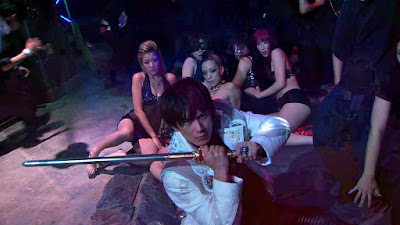Breathing life into what could probably be the most annoying and dense character ever to be landed by a hafu celebrity, variety show-favorite Becky plays a rich, spoiled, delusional girl who wreaks havoc on the lives of men to head-splitting-throw-a-brick-at-your-television-screen-wanna-grab-her-by-the-neck perfection in a drama that can only be described as bonkers. Absolutely bonkers.
Mentally taxing for being ridiculously shallow, not to mention utterly pointless to the very end, Anna-san no Omame has a premise that would no doubt be funny or acceptable had it been a 20-minute anime feature but seeing it unfold onscreen with real live people is a whole different matter... Mitai na~
Mentally taxing for being ridiculously shallow, not to mention utterly pointless to the very end, Anna-san no Omame has a premise that would no doubt be funny or acceptable had it been a 20-minute anime feature but seeing it unfold onscreen with real live people is a whole different matter... Mitai na~
If there's any doubt that this series has the ability to firmly divide viewers on opposite ends of the love it or hate it spectrum, the fact that this came highly recommended by a trading buddy of mine (who also happened to tune me into Kekkon Dekinai Otoko) should be sufficient proof of its polarizing power. It's taken me four years to resume watching it after the shocking onslaught of silly that was episode one, and another year or so to decide to blog about it. And now in an effort to get it off my draft list, I present you with an antedated post that took another year to complete.
* * *
When a regular, nondescript man named Kyoutaro (Kashiwabara Shuji) gets to exclusively date the epitome of Japanese beauty in Anna (Anzu Sayuri),
he's beside himself with joy. But dating the most-sought-after woman in
town includes establishing ties and getting along with the person whom
she considers to be an invaluable person---her friend and roommate, Lily (Becky).
Under normal circumstances acceding to this request would not be such
an imposition but as it turn's out Anna's friend has it in her head that
she's irresistible to all men, including Kyoutaro, when nothing could
be further from the truth.
This misunderstanding of sorts would lead to countless awkward, and at times dangerous situations, which merely serve to cement Lily's belief that her exceptional charm and beauty is to blame for all the trouble that people close to her encounter. Of course, Kyoutaro would want nothing more than to distance himself from this loud, crazy-eyed girl who can't seem to utter a sentence without puffed cheeks and a twitchy gesture, but Anna is adamant to have him shadow her best friend in order to protect her from a host of unsavory characters. Forced to do her girlfriend's bidding, Kyoutaro manages to save Lily from sexual predators, ruthless hostesses and even gangsters; the unintended result, however, is that Lily is now convinced that he harbors deep feelings for her.
Over the top and repetitive with a humor that can be a tad offensive, Anna-san Omame offers a brand of comedy that is highly dependent on one shtick; it draws all its laughs on the supposition that a character as exasperating and naive as Lily exists, and that a person such as Kyoutaro would endure all sorts of mayhem just to be with a dream girl who's best friends with a lunatic.
This plot device is actually made more outrageous once the viewer gets to meet Lily's affluent family which apparently had a hand in perpetuating Lily's delusions. There's the overprotective brother (Ikeda Tsutomu) whose concern for Lily can be quite touching if one were not inclined to wonder where he gets the free time to stalk watch over his sister and the parents (Kusakari Masao and Takahashi Hitomi) who consistently lavish their child with praise, raising her to believe that the world is her oyster.
Utilizing whacky visual effects
that can be surmised to have been inspired by the thought of what it
might have been had the Care Bears and My Little Pony & Friends
embarked on an acid trip, Anna-san Omame saturates the show with bright colors, fantasy sequences, and dizzying camera shots that spin and zoom in more than necessary. This is one of those series that is zippy and zany, making use of in-your-face physical comedy that might not sit well with viewers in search of intellectual stimulation.
Subtlety is not its strongest point, in fact, everything about the production matches the potent energy of its protagonist. Lily's outfits are a cosplayer's dream and the set pieces that represent each of the three main characters reflect their different personalities, following a specific color scheme. Scenes are shot at unexpected angles, some as a testament to the giddy and unsteady tone of the series and even some turning out to be surprisingly creative and beautiful in their own right.
The series hits its stride when it decides to parody drama tropes and iconic movies. There's really not much to say about character development but some unexplained personality quirks and the occasional plot point tend to fool the viewer into thinking that there's more to it than previously expected. It's just unfortunate that the opportunity for exposition all turn out to be a joke and whatever glimmer of hope for an actual story is nothing but a hoax. For example, the reason for Anna's unwavering loyalty and penchant to brush off Lily's crazy antics is given a flimsy back story, while the opportunity to give Lily some depth and a possible happy ending is squashed when the series arbitrarily reverts back to its merry, non-committal tone. Whether or not one chooses to go for the ride is a matter of preference, but to its credit Anna-san no Omame does not aspire to be something that it's not, nor does it give the impression that it has a solution to this unusual love triangle.
Fledgling celebrity Rebecca Eri Ray Vaughan, popularly known as Becky, bulldozes her way through the series, showing unwavering commitment in playing Lily and all her insufferable inanities. This break out role seems to be the first of a series of obnoxious, grating characters given to Becky as a hafu artist, followed by her role as Tanya in the Nodame Cantabile series and her stint as the tempestuous Kaiko in the Kaibutsu-kun SP. Not counting her sweet and dainty singing career as Becky♪♯, this girl has unluckily been pigeonholed to flutter those lashes and use those green eyes to the annoyance of many, when she's obviously capable of so much more. She actually excels when allowed to do something else---of note is how she single-handedly carried the body-switch scenario in episode 6 and how she demonstrated her untapped potential as a romantic interest in the penultimate episode of this series. Her appearance as the outgoing Saki to Ito Atsushi's stiff and button-downed Kazuo in the fourth segment of Propose Kyoudai was a step in the right direction, however the noxious imprint left by this series will most likely linger on.
Subtlety is not its strongest point, in fact, everything about the production matches the potent energy of its protagonist. Lily's outfits are a cosplayer's dream and the set pieces that represent each of the three main characters reflect their different personalities, following a specific color scheme. Scenes are shot at unexpected angles, some as a testament to the giddy and unsteady tone of the series and even some turning out to be surprisingly creative and beautiful in their own right.
The series hits its stride when it decides to parody drama tropes and iconic movies. There's really not much to say about character development but some unexplained personality quirks and the occasional plot point tend to fool the viewer into thinking that there's more to it than previously expected. It's just unfortunate that the opportunity for exposition all turn out to be a joke and whatever glimmer of hope for an actual story is nothing but a hoax. For example, the reason for Anna's unwavering loyalty and penchant to brush off Lily's crazy antics is given a flimsy back story, while the opportunity to give Lily some depth and a possible happy ending is squashed when the series arbitrarily reverts back to its merry, non-committal tone. Whether or not one chooses to go for the ride is a matter of preference, but to its credit Anna-san no Omame does not aspire to be something that it's not, nor does it give the impression that it has a solution to this unusual love triangle.
Fledgling celebrity Rebecca Eri Ray Vaughan, popularly known as Becky, bulldozes her way through the series, showing unwavering commitment in playing Lily and all her insufferable inanities. This break out role seems to be the first of a series of obnoxious, grating characters given to Becky as a hafu artist, followed by her role as Tanya in the Nodame Cantabile series and her stint as the tempestuous Kaiko in the Kaibutsu-kun SP. Not counting her sweet and dainty singing career as Becky♪♯, this girl has unluckily been pigeonholed to flutter those lashes and use those green eyes to the annoyance of many, when she's obviously capable of so much more. She actually excels when allowed to do something else---of note is how she single-handedly carried the body-switch scenario in episode 6 and how she demonstrated her untapped potential as a romantic interest in the penultimate episode of this series. Her appearance as the outgoing Saki to Ito Atsushi's stiff and button-downed Kazuo in the fourth segment of Propose Kyoudai was a step in the right direction, however the noxious imprint left by this series will most likely linger on.






























































